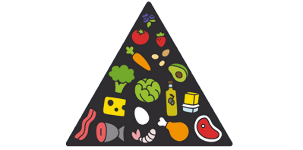“The keto diet burns fat but still maintains very good caloric intake so you can maintain muscle mass and a good metabolic rate. It is not for nothing that more and more people are choosing the keto diet. These are not just the principles of nutrition, this is a biohacking tool. “- these words can be read by followers of the keto diet on social networks today. Is it really? Let's look at this question objectively, and the pros and cons
weigh upThe essence of the ketogenic diet is to eliminate carbohydrates as much as possible (and this includes not just baked goods, pasta, sugar and its substitutes, but also honey, fruits, root vegetables, grains and rice in all forms). A 5% carbohydrate quota is allowed in the diet based on berries, herbs and some vegetables.
For comparison: in the standard food pyramid regulated by the World Health Organization as the basis for a balanced diet, the carbohydrate content can be up to 60%.
As you know, it is not safe to practice a protein diet, but where do you get your energy from? The answer is in fats. You shouldn't be afraid of them; Cholesterol horror that terrified people throughout the 20th century is viewed as the intrigue of interested pharmaceutical companies in the 21st century. It's important to make a correction: we're talking about the right fats, which are high in polyunsaturated fats, rather than the juicy kebabs, margarine and trans fats that are harmful to health.
WHAT IS KETOSE? HOW DOES THE KETO DIET WORK?
Nutritional principle
The body uses carbohydrates as the main fuel for the brain. If the carbohydrates in the diet are sharply reduced below 20 grams per day, the amount of glucose is critically reduced - and there is not enough energy for normal function and fat oxidation. In order to nourish the brain, the body begins the process of obtaining alternative energy - ketosis. This is a condition that develops as a result of the lack of carbohydrates in cells when the body begins to break down fat in order for energy to make large numbers of ketone bodies. In the normal state, the concentration of ketone bodies in the blood is very low, as they are replaced by glucose and the body does not need any additional energy. During ketosis, the concentration of ketone bodies increases sharply.
Ketosis can also be achieved by fasting for several days, but this is extremely harmful. The keto diet is an alternative to full fasting that is less damaging to the body. Along with food, we continue to receive all the necessary substances and are not hungry, only exclude carbohydrates and force the body to begin the process of fat loss.
The keto diet has a pretty solid scientific basis; She showed excellent results in children and adults with epilepsy - up to the disappearance of the convulsive syndrome against the background of withdrawal from anticonvulsants. It is effective for people with certain autoimmune diseases and Alzheimer's disease, as well as for people with cancer. The fact is that tumor cells "feed" on glucose and studies have shown that switching to a low-carbohydrate, but high-fat diet leads to a regression of the tumor process.
Observations from patients who adhere to this nutritional model have shown that, strangely, a person feels a surge of energy, brain activity increases, and mood improves. The secret lies in biochemical processes: the body switches to new sources of energy - ketones, which are produced when fat is broken down.
The first popularizers of the keto diet were biohackers who wanted to live healthy and active into old age.
Hollywood stars joined them, and then the keto diet craze took over the world. Removing excess fat from eating fats may need to be done simply.
However, only an experienced nutritionist should prescribe the keto diet. Not a nutritionist, insta-food blogger, nutritionist, or ketoadept. There are certain contraindications to this food system, for example diabetes, chronic pancreatitis, cholecystitis, familial hyperlipidemia, and so on. In addition, at the beginning of the diet, when switching to other sources of energy, complex adaptation of the body is common.
KETO DIET FOOD PYRAMID

The main disadvantages of the keto diet:
- This is an unbalanced diet. When you completely eliminate carbohydrates, you lose a large number of nutrients for the body.
- There may be a tendency to constipation. For the organs of the gastrointestinal tract, such a diet does not make sense at all.
- Acetone odor from the body, urine and mouth may occur. To minimize the odor, you should drink more than 2 liters of water a day to get more acetone out.
- All carbohydrates are excluded, a process that is normally not that active is artificially triggered, increasing the burden on the liver. That's pretty unhealthy.
Main benefits of the keto diet:
- Rapid weight loss. The exclusion of carbohydrates from the diet does not allow the body to use substances as usual: store fats "in reserve" and use carbohydrates as the main energy.
- There is no constant feeling of hunger like with other diets. This means that there are no sharp spikes in blood sugar (ketone bodies play the role of glucose).
- High-calorie foods fill you up and help avoid disturbances.
- Fats are burned in the body and muscle mass is retained.
For whom this type of diet is contraindicated:
- pregnant;
- people with diseases of the gastrointestinal tract;
- people with type 1 and 2 diabetes mellitus;
- people with endocrine pathologies;
- Breastfeeding
Is It Really Possible To Lose Weight On A Keto Diet?
The keto diet promotes weight loss, energizes and enables a person to stay full longer. The secret to more satiety and energy lies in the fact that most of the calories enter the body with fats, which are very nutritious and slow to digest. As a result, people on a keto diet burn fewer calories because they no longer suffer from hunger pangs. You no longer have to eat as much or as often.

Its main goal is to keep a person in a state of natural ketosis continuously. Typically, a full keto adjustment takes around four to eight weeks. After this time, the level of glycogen (glucose stored in your muscles and liver) decreases, excess water is released from the body, muscle endurance increases, and the person feels a strong surge of energy. The first time you eat low-carb foods in the ketogenic diet, you need to monitor your ketosis. This way you will know exactly what you are doing right and what is wrong and whether you need to make changes to your diet. The simplest test is the ketone breath test. After a few days you will feel a fruity, slightly sour or even metallic taste in your mouth. What is the reason? During ketosis, your body synthesizes ketone bodies: acetone, acetoacetate, and beta-hydroxybutyrate. Acetone is excreted in the urine and breathing, which is what causes "ketone breathing" to occur. Typically, bad taste and bad breath will subside after a few weeks.
Side effects of the diet
A decrease in the percentage of carbohydrates leads to a decrease in the level of insulin in the blood. As a result, the kidneys receive a signal to release excess sodium. Between reducing your sodium intake and flushing out excess sodium build-up, your body releases more baking soda than normal and, as a result, your sodium and other electrolyte levels decrease. When this happens, you may experience fatigue, headache, cough, runny nose, irritability, and nausea. This condition is known as ketoplash. It is important to understand that it was not caused by the flu virus. Such a cold is neither dangerous nor contagious. The name in this case only reflects the similarity of symptoms. When signs of discomfort appear, many people become frightened, believing the keto diet has negatively affected their health, and start eating carbohydrates again. In fact, the keto chill is a sign that your body has finally gotten rid of sugars, carbohydrates, and industrial foods and is building up again to use fats for energy. Usually it only takes a few days. That's how long the adjustment takes. You can alleviate the condition by adding more sodium and electrolytes to your diet and drinking more water.
In any case, you should consult your doctor before starting a diet and monitor your condition during this time: blood biochemistry, blood pressure, condition of the cardiovascular system and the organs of the gastrointestinal tract.
It is important to emphasize the main thing: Everyone is different - with a special body structure, a genetically inherited constitution, stress factors, physical activity and acquired eating habits that have an enormous influence on health.
The ketogenic diet is a high-fat, low-carbohydrate eating plan that puts the body in a state called "ketosis" and burns stored fat. The celebrity keto diet was developed for children with epilepsy and has become increasingly popular in recent years.
A year ago, however, most of the media questioned the benefits and even the safety of this weight correction method. The ketogenic diet is not a panacea for weight loss. Avoiding carbohydrates leads to an unbalanced diet (you deprive yourself of essential nutrients), headaches, weakness, and chills. And the keto diet can also cause a lipotoxic condition and, as a result, cause inflammation of the liver, gallbladder, and stomach. In the long term, it can increase your risk of atherosclerosis and insulin beat.Listen and study your body. And then, if you want, you can lose those extra pounds quickly by choosing the best weight correction method for yourself.































































